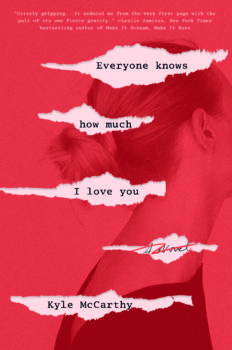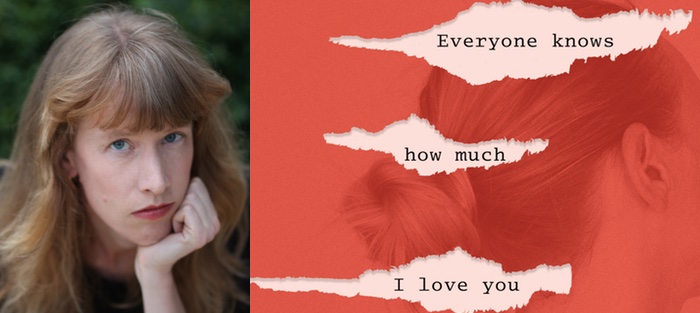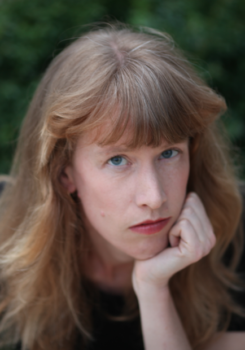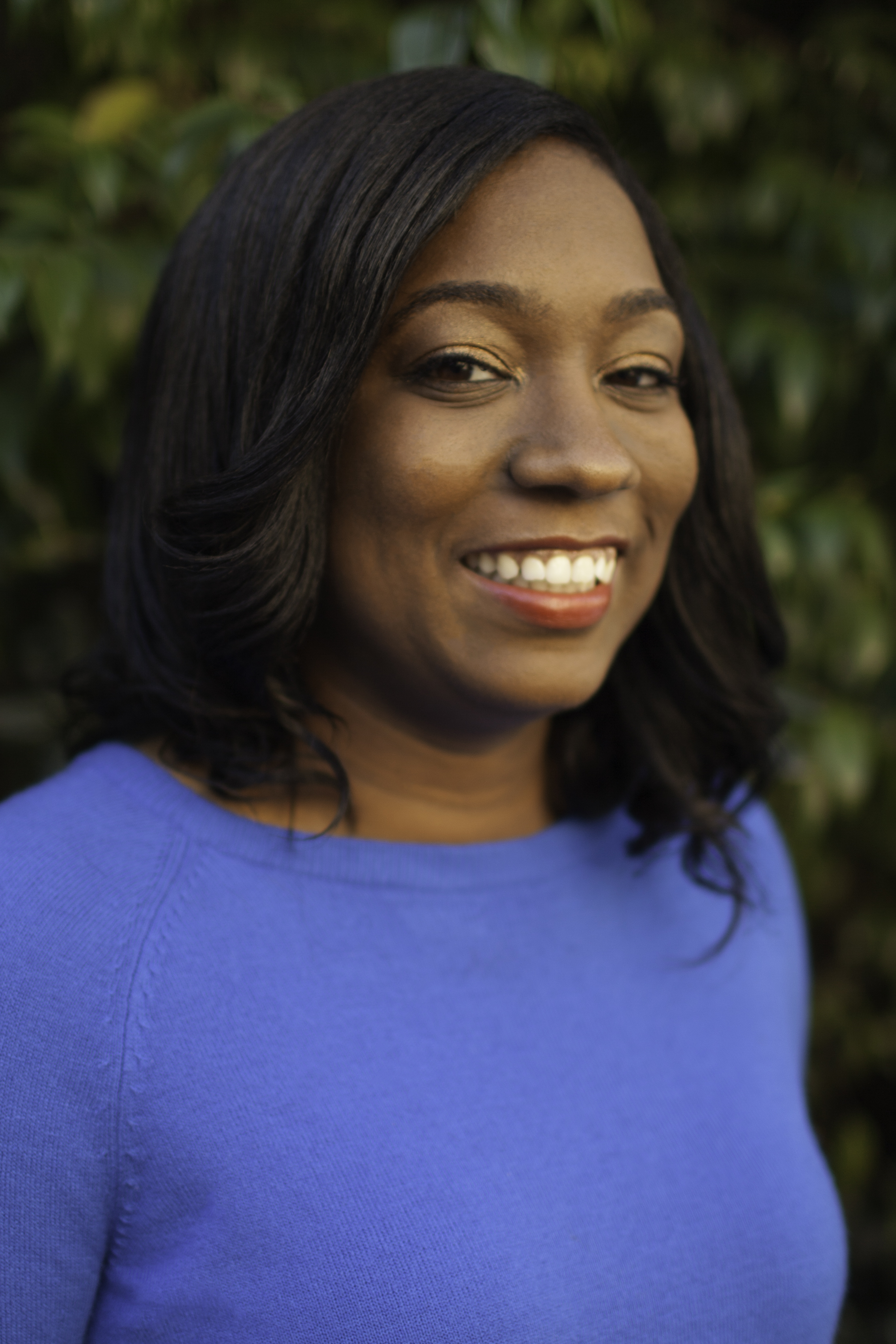I first met Kyle McCarthy more than a dozen years ago, during one of the Columbia Publishing Course’s shameless networking events known as a “sherry hour.” We caught each other’s eyes, and in that moment shared a silent exchange: What the hell have we gotten ourselves into? The answer, for both of us, was a short-lived career in book publishing. After working as an editorial assistant at Knopf, Kyle attended Iowa Writers’ Workshop and went on to publish short stories and essays in American Short Fiction, Los Angeles Review of Books, and Harvard Review. Her work has been included in the Best American Short Stories series and NPR’s Selected Shorts. But I first encountered her charmed words when, the summer before we both left New York to pursue our MFAs, she shared with me her novel-in-progress. It was a family drama, and although it never reached bookshelves, I still think of it often.
Kyle’s debut novel, Everyone Knows How Much I Love You, will be published by Ballantine in June, and I was thrilled to get my hands on an advance copy. The novel gives life and voice—what a voice!—to Rose, our first-person narrator and anti-heroine. Newly arrived in New York City and trying to build a life there, Rose tutors the offspring of Manhattan’s wealthy elite while working on a novel she keeps secret—because it stars Lacie, Rose’s former best friend whom she betrayed in high school, and the unlikely fulcrum on which Rose’s new life in New York now swings. After a chance reunion, Rose convinces Lacie to let her move in, and the two, now roommates, fall into an uneasy friendship, as Rose finds herself increasingly drawn to all aspects of Lacie’s life, including her boyfriend. Even as Rose threatens to repeat the worst moments of her and Lacie’s lives, I couldn’t help but be enthralled by her misbehavior. Self-aware and psychologically astute, Rose is fascinated by the darkness lurking in each of us.
Everyone Knows How Much I Love You is a story of friendship, desire, and obsession. Communicating by email, Kyle and I discussed old writing adages, sex scenes, and New York City, where we have both returned for our post-MFA lives. Here, like Rose, we have tried to balance paying the bills with attempting to make it as writers.
Now, Kyle has made it. I hoped she might tell me how.
Interview:
Brad Wetherell: One thing that drives me nuts about interviews is when the interviewer assumes an author’s protagonist is a stand-in for the author herself. Rose is not you, but there are some circumstantial similarities: Harvard, Iowa Writers Workshop, tutoring in NYC. How do you feel about the old adage “write what you know”?
Kyle McCarthy: When I first started writing Everyone Knows, I was coming off too many years of working on a novel that had once compelled me, but which had slowly become a millstone around my neck. The characters in that novel were quite unlike me—some were middle-aged, and others were teenage boys—and so, in order to juice up my writing practice, I decided to let myself write something close to my own life.
But then a funny thing happened. Almost immediately, Rose took on a life of her own. She started doing things I would never do, thinking things I have never thought. I can remember nearing the end of the second draft, and thinking, Ahhh, I see. She’s a little bit evil.
For me, then, there’s something about grounding your character and setting in familiar details that can allow for fuller, freer invention when it comes to character and plot. Setting my fictional world in a familiar place, and keeping some of the proper nouns of my life, gave me a stronger platform from which to leap off into the unknown.
Having said all that, I also think that in this book I’m consciously playing with the way self-revelation, or the appearance of self-revelation, can be a kind of mask. If you seem to be offering up a “true” slice of yourself, you can keep your private self more private. Rose is not me, but I think it’s a kind of fun game to tease the reader a little bit: Do you think this is me?
 New York City itself features so prominently in the novel, and many of my favorite passages are about the countless ways to live in the city. Was there anything about living in—or trying to be an artist in—today’s NYC that you were most interested in exploring?
New York City itself features so prominently in the novel, and many of my favorite passages are about the countless ways to live in the city. Was there anything about living in—or trying to be an artist in—today’s NYC that you were most interested in exploring?
Well, I think New York City is an interesting place to put a character, because there are instantly all these intense outside pressures working upon them: financial pressure, small living spaces, all the petty annoyances that come with living in a dense place. It’s a place of contradiction, which feels generative. And it’s where I’ve lived nearly all of my adult life, so it’s what I know.
Especially when writing the first half of the novel, I felt the young woman moves to New York trope breathing down my neck. There were certain beats—finding a place to live, finding a job, dealing with roommates, scraping together enough cash—that felt so familiar. I wanted to make it new, but at the same time I wanted to be in dialogue with the literary tradition of young artist comes of age in the city. I wanted to write a version of that, a bent and twisted version.
You mentioned being aware of the young woman moves to the city trope and the young artist comes of age in the city tradition. Were there particular books with which you imagined your novel being in conversation? Or, perhaps, books you turn to for writing inspiration more generally?
Ah, I love this question! I kept a shelf of books by my desk while I was writing Everyone Knows. The volumes I turned to again and again included: The Talented Mr. Ripley, by Patricia Highsmith; The Woman Upstairs, by Claire Messud; As a Friend, by Forrest Gander; and Two Friends, by Alberto Moravia. Lots of wonderful books about jealousy and friendship, though I want to give a special shout-out to As a Friend—it’s a miracle of compression and tone.
As for general sources of inspiration: Out of Sheer Rage by Geoff Dyer always puts me in the mood to write. Just a paragraph or two of his hilarious conversational rantings convinces me that writing is easy and fun (haha). And the inimitable Eve Babitz always makes me smile. Slow Days, Fast Company is one of my favorites.
Your novel’s New York is still so full of artists and intellectuals. Is that the New York you know? As a young artist living in Brooklyn, what is your impression of the relationship between the arts and the city in 2020?
It is the New York I am fortunate to know, though it’s hard to say what will remain of it after the coronavirus pandemic ebbs. Even before the shut-down, though, a vampiric relationship existed between the city and the arts. Artists—and their galleries, bookstores, theaters, and performance spaces—are what make the city appealing to so many people, and yet gentrification, lack of affordable health care, skyrocketing rents, etc. all conspire to push artists and art organizations out. We generate value for the city, and yet there is often little to no support for us. It has been dispiriting to watch so many friends move away; a kind of exodus began when people reached their mid-thirties, and I think the economic downturn will only accelerate this.
And, of course, I realize that by the time this interview appears, everything I’m saying may be woefully out of date. It’s late April now, and nobody knows exactly how COVID-19 is going to alter the cityscape, which beloved arts organizations and bars and restaurants and shops will be wiped out, which will survive, and what will grow in the razed ground.
This is a sexy novel. How do you approach writing sex scenes?
Ha! Thank you. I like writing sex scenes—I think they’re a wonderful chance to reveal something new about characters and their relationships. After all, our characters are embodied creatures, and sex is a wonderful, strange playing field in which to reveal their desires, fantasies, and aggressions. Also, sex is kind of funny and absurd. It’s dangerously easy for fiction to turn into two talking heads—talking heads in a restaurant, or in the living room. What a relief, then, to explore character and emotion through the body.
I think often when people are afraid of writing about sex, it’s because they’ve internalized the idea that sex is something that everyone does in the same way, as if your characters cease being themselves, and transform into these weird automatons, when they get naked. But everyone doesn’t do sex in the same way, and figuring out how two characters encounter each other in the bedroom can be a wonderful way of revealing something new between them.
This is a novel, in part, about writing a novel. And although this is the first novel you have published, it isn’t the first novel you’ve written. What did you learn from your experience with the first novel you wrote? How, if it all, was writing this one different?
Hmmm . . . As you know, I worked on my first novel for a long time, nearly eight years. I really cut my teeth on it. I sweated every sentence. And it’s hard for me to know how to feel about the time I spent on that book, especially the last three years or so of work. On the one hand, the novel got much better, in large part due to the excellent guidance from the agent I was working with at the time. On the other hand, in the last few years the love really started to go out of it for me. I was obsessed with this idea of perfection, of making it as good as possible, which for me meant as tidy as possible. And it is a very tidy, tight, clean novel. But now, when I look back on it, I think it could use some air.
Writing the second novel, this novel, was entirely different. I decided from the get-go that I wasn’t going to worry about sentences too much. I wasn’t going to try to be pretty, or profound, or poetic. I was going to try to have fun, and follow the energy.
So I wrote a bunch of very sloppy drafts very quickly—I did two six-week writing residencies back to back in 2015, and by the end of those I had the first full draft—and then carefully cut out and refined the book from there. Especially in the last year, working with my brilliant editor Sara Weiss, there was a real process of refinement, but even then, I was really trying to have fun and pursue the messy, organic, imperfect vivid novel over the “perfectly constructed” one (as if perfect were even possible!).
Is it true, too, that the novel grew out of your short story, “Ancient Rome”? In the story we know Rose is an aspiring writer, but mostly we encounter her as a tutor to a wealthy pupil, Isabel, whose assignment—and whose particular brand of beauty and being—prompts Rose to wrestle with the historical and contemporary complexities of living as a woman. How and when did you know you could build a novel around Rose?
It is true! In fact, for a long time “Ancient Rome” was the first chapter to my novel. It was only in the last month or two of editing that we cut it—my editor pointed out that it was a kind of vestigial organ.
It’s interesting—it wasn’t so much that the plot or character of “Ancient Rome” begged to be enlarged, which is how a short story often grows into a novel. It was more that I had found a voice that I wanted to follow. I liked how Rose was sort of casually arrogant, even as she was also perceptive and curious. That contradiction felt generative, as well as her sort of wry, knowing voice.
Can you share one piece of advice from your MFA that has stuck with you?
Marilynne Robinson once said, “Writing is like prayer. You might as well be honest.” I think about that a lot.
And is there one piece of advice you have for someone working on their debut novel?
Pursue pleasure. Obviously, writing a novel is hard. It’s so hard it’s nearly comical. There will be days when you hate the thing, and other days when you feel like your head will explode, trying to hold the whole thing in mind, and other days when you feel like you’re up against some problem, of plot construction or character motivation or whatever, that seems intractable. But I do think that it should also be basically fun. Even when you’re miserable, it should be a good kind of misery. You should be interested in what you’re writing. You should be amusing yourself.







